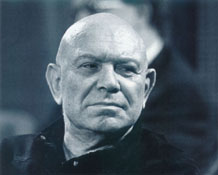|
Published with a kind permission of Teodor Shanin.
See the original at http://www.msses.ru/shanin/isolationism.html
The new isolationism: West versus Russia
An assessment, an objective and a project
Teodor Shanin
 The contemporary state of understanding of Russian society
by "the West” is deeply flawed and increasingly dangerous. It is flawed
in its bias towards images of chaos and mafia plus the war in Chechnya
as the sole features of contemporary Russia. It is dangerous because “turning
one's back” on Russia will not make it go away: this vast country will
always be a major factor of global history. The contemporary state of understanding of Russian society
by "the West” is deeply flawed and increasingly dangerous. It is flawed
in its bias towards images of chaos and mafia plus the war in Chechnya
as the sole features of contemporary Russia. It is dangerous because “turning
one's back” on Russia will not make it go away: this vast country will
always be a major factor of global history.
It is also counter-productive to the West’s own interests and declared
aims as it serves to underlie the West's inadequate responses. To take
but one example, the European governments attempted most recently to 'punish'
Russia by freezing funding for TACIS cooperation between Russian and European
Universities, a move which delighted Russian nationalists, about which
the Russian government cared not at all and which would remove an important
source of support to those who mostly resist anti-western views and moves.
Narrow and biased visions of Russia amongst the “Westerners” are reinforced
by the crudity and outright lies within the Russian official statements.
Growing sense of disillusion in Russia with the West (and vice versa) as
well as Russia’s feeling of humiliation and the loss of hope for a stable
well-of-and democratic contemporaneity are no justification to it but explain
its strong emotional charge. All of that carries its own dynamic: nationalism
and isolationism, both Russian and anti-Russian, each blind to its own
excesses, each reinforcing the other in a vicious spiral. As time goes
by, selective vision, caricaturing stereotypes and old prejudices reinforce
each other and penetrate deeper and deeper. It is not any longer routine
argument between diplomats and propagandists but new reality of popular
perceptions by which future history may become defined.
During the last decade much was done institutionally as well as was
happening privately to advance understanding of the West among the Russian
elite and its young – an opening of windows to the West has been taking
place. Unfortunately little was done the other way round. That state of
affairs worsened following events such as the August 1998 financial collapse
and the second Chechen war. But it was also accelerated by the way in which
the Western mass media tends to present Russia (if at all) just as incomprehensible
and evil.
The rise of new isolationism, ill-informed, simplistic and militant,
calls for an urgent effort to open windows into Russia aiming at a more
realistic understanding of Russian society, especially so by the political,
economic and media-producing elites of the West. It should introduce real
Russia, warts and all, with no cosmetics but within a balanced picture
of its life, ways of survival, collective thought, dynamics and problem
resolutions. In particular, it must go behind the daily scandals and the
thin layer of “oligarchic” speculators and political hacks, to Russian
society at large, especially so to the 90% of the population outside Moscow.
Corrupt officials, impudent thieves and vicious generals come together
with remarkable schools run by selfless teachers, quite a number of effective
managers who pull their enterprises out of general morass, the currently
blossoming of NGOs of humanitarian type, the brilliant and ever full theatres
the numbers of which doubled within the last few years. In badly hit regions
object poverty goes together with remarkable survival abilities of family
networks within informal economies and pockets of group solidarity on a
major scale. And so on.
For the sake of all, the western vision of Russia must be made more
realistic. Russia should be looked at in all its complexity as well as
in the light of historic changes taking place, i.e. in terms of generations
rather than of a few weeks at a time. Such transformation of vision may
be seen as a task unbearably huge but that should not justify inaction
while we look on at deepening malaise. Even limited steps may produce a
multiplier effect if well aimed and effectively executed.
The main impediment to efforts in that direction is the only too human
tendency to let off steam in an avalanche of angry words and then let it
all sink into nothingness. As against that one should recover the past
merchant tradition by which a deal was made final not just by the signatures
on a contract but by a single coin passing from hand to hand between its
participants. It is the deed, even small, that validates.
With that in mind a group of people increasingly worried by the current
dynamics of West/Russia relations (and which included diplomats and bankers,
journalists and academics) met recently in Cambridge to initiate action
aiming to counter the neo-isolationist trend. A Programme ““Window into
Russia” was initiated. A number of steps was planned: symposium introducing
Russia NGOs to their British counterparts, a programme introducting-via-imersion
of westerners into provincial and rural Russia, a parallel programme concerning
Russian schools, a seminar addressing the issues of neo-isolationism to
be held in London a conference of the club of Western businessmen in Moscow
to meet with Russian businessmen over issues of social responsibility and
so on. An organizational structure was established to provide for further
action. It consists of groups of support, an executive committee and a
trust directed by a board of trustees. First steps are already in train
and we intend to proceed.
|